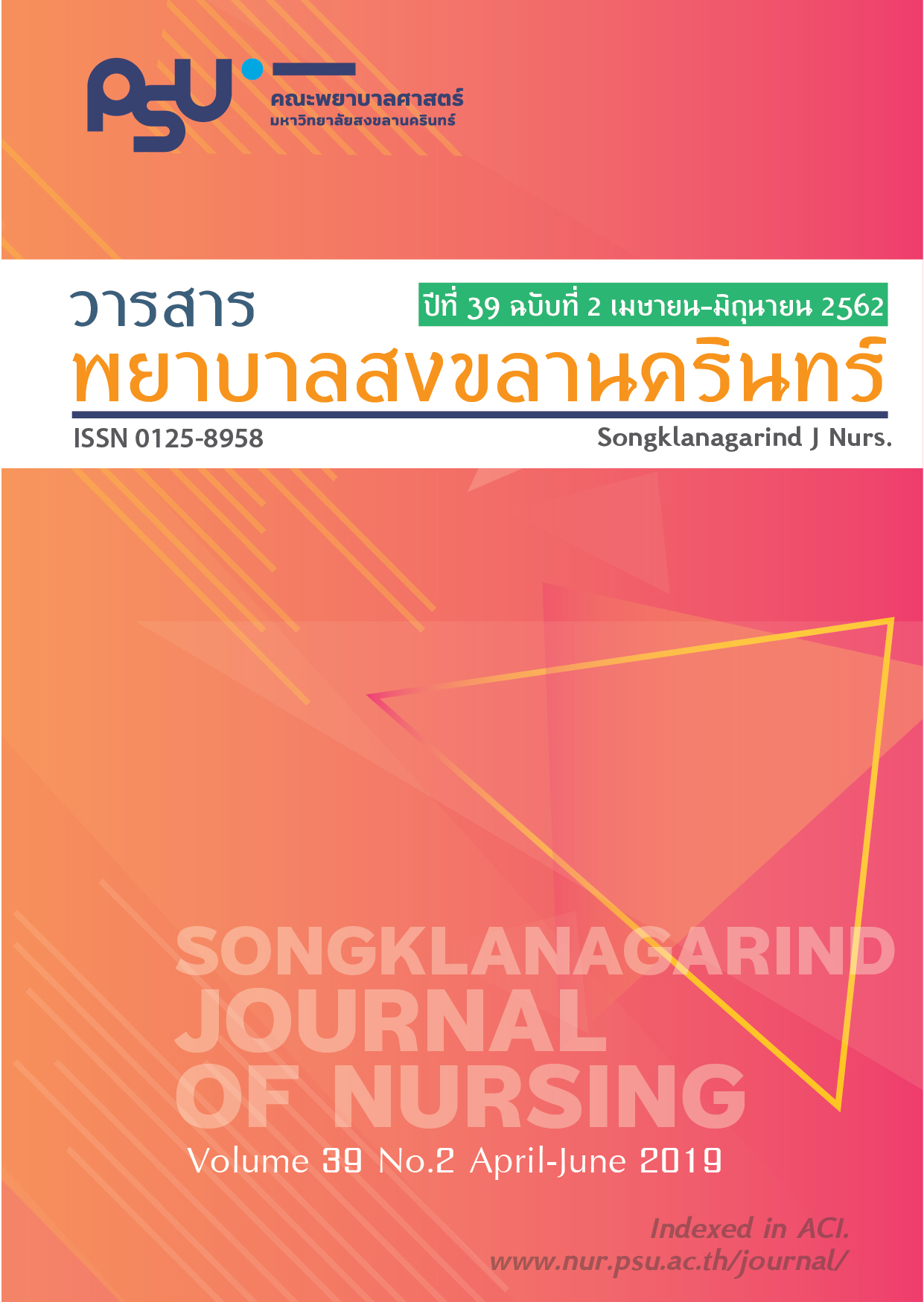The Effectiveness of the Health Behavior Change Program with 7 Colors Ball Tool on Knowledge, Health Belief and Behavior Related to the Prevention and Control of Hypertension and Diabetes Mellitus, in Maeka Sub-District, Muang District, Phayao Province
Main Article Content
Abstract
This quasi-experimental research aimed to examine the effectiveness of the health behavior change program with 7 colors ball tool on knowledge, health belief and behavior related to the prevention and control of hypertension and diabetes mellitus in Maeka Sub-district, Muang district, Phayao province. Research design was pretest-posttest two group design. The samples comprised of 60 DM and HT patients with the severity of red and orange disease. Samples were purposively selected according to the specific qualifications and divided into experimental and comparison group with 30 samples. The experimental group received the health behavior modification program according to the concept of health belief model theory, participation theory and social support with “7 colors ball” tool for 8 weeks. Data were collected by questionnaires which were validated by 3 experts. The reliability test of the knowledge questionnaires with KR20= .84, and questionnaire concerning health belief and behavior related to the prevention and control of hypertension and diabetes mellitus with Cronbach’s coefficient alpha = .72 and .82 respectively. Data were analyzed using descriptive statistics, paired t-test and independent t-test. This quasi-experimental research aimed to examine the effectiveness of the health behavior change program with 7 colors ball tool on knowledge, health belief and behavior related to the prevention and control of hypertension and diabetes mellitus in Maeka Sub-district, Muang district, Phayao province. Research design was pretest-posttest two group design. The samples comprised of 60 DM and HT patients with the severity of red and orange disease. Samples were purposively selected according to the specific qualifications and divided into experimental and comparison group with 30 samples. The experimental group received the health behavior modification program according to the concept of health belief model theory, participation theory and social support with “7 colors ball” tool for 8 weeks. Data were collected by questionnaires which were validated by 3 experts. The reliability test of the knowledge questionnaires with KR20= .84, and questionnaire concerning health belief and behavior related to the prevention and control of hypertension and diabetes mellitus with Cronbach’s coefficient alpha = .72 and .82 respectively. Data were analyzed using descriptive statistics, paired t-test and independent t-test.
Results revealed that the mean score of knowledge, health belief and behavior related to the prevention and control within the experimental group before and after the experiment were significantly different (t= -9.38, p< .001, t= -10.42, p< .001 and t= -20.40, p< .001 respectively) and between the experimental and comparison group were significantly different (t=5.57, p= .009, t=4.07, p< .001 and t=14.24, p< .001 respectively). The experimental group had decreased severity of the disease. While the comparison group had a constant level of severity of disease. The process of community participation in the design of health behavior change program is the main of success in changing people’s health behavior.
Article Details
References
Kanjanapiboonwong A, Srivanichakorn S. Situation of non-communicable diseases risk factors for non-communicable diseases and the provision of service systems to respond to non-communicable diseases according to the goals and indicators of the world in Thailand, 2010-2015. Nonthaburi Province: Sahamitr Printing and Publishing Co Ltd. 2016. Thai.
Bureau of Non Communicable Disease. Annual report 2015. Bangkok: WVO Officer of Printing Mill. 2016. Thai.
Phayao Provincial Public Health Office. Annual report 2015. Phayao Province; 2016. Thai.
Tienthavorn V. Surveillance, control and prevention system of DM and HT in Thailand: Policy to action. 3th ed. Nonthaburi Province: The Ministry of Public Health; 2013. Thai.
Khampeng S, Boonpradit A. The effects of using health program and social support among people with hypertension in Donpud district, Saraburi province, Thailand. NJPH. 2012; 22(3): 112-23. Thai.
Phermsin S, Duangsong R. The effects of the application by health belief model and social support to control blood sugar among diabetes mellitus type 2 patient, Ubolratana district, Khon Kaen Provincd. KKU Research Journal. 2011; 11(4): 89-100. Thai.
Rodkolm W, Wattanasupt N, Suphunnakul P, et al. Support and health belief in self-care behavior among essential hypertension patients receiving services at Promphiram Hospital, Phitsanulok Province. Journal Nurse NU. 2012; 6(2): 79-89. Thai.
Chuenwatthana W, Sonpakdee N. Self-care behaviors of diabetic patients at Bnagmeanang Tambon, Bang Yai District, Nonthaburi Province. PTU Journal. 2014; 6(3): 163-70. Thai.
Tienthavorn V. Communication to drive public policy on surveillance, control, prevention of diabetes and hypertension: Case study, Singburi province [dissertation]. [Bangkok]: Krirk University; 2015. 223 p.
Auttama N. Study of knowledge, attitude and practice of seven colour balls guideline on surveillance, control and prevention of hypertension in personal of University of Phayao who received annual medical examination [Thesis]. [Bangkok]: Chulalongkorn University; 2016. 87 p.
Becker MH. and Maiman LA. “Social behavioral determinants of compliance with health and medical care recommendations.” Medical Care. 1975; 13(5): 10-24.
Minkler M. Application of social support theory to health education: Implications for work with the elderly. HEB: SAGE Journals. 1981; 8(2): 147-65.
Bureekul T. Participation: Concept, theory and process. Documents for study visits of the committee on political development and public participation of the Senate. Bangkok: King Prajadhipok’s Institute. 2008. 38p. Thai.
Cohen J. Statistical power analysis for the behavioral sciences. 2nd ed. Hilsdale, NJ: Lawrence Erlbaum Associates.1998.
World Health Organization. The Ottawa Charter for health promotion [Internet]. First international conference on health promotion, Ottawa, 21 November 1986 [cited 2017 May 15]. Available from https://www.who.int/healthpromotion/conferences/previous/ottawa/en/
Kaweekorn P, Prasomruk P. A model development of self-care behavior for blood sugar control type 2 diabetic patients, in Loengnoktha Crown Prince Hospital. CHD-KKU Journal. 2016; 4(3): 307-22. Thai.
Throngthong C. The empowerment for diabetic prevention of elderly diabetic risk group in Napho sub-district, Thungsong district, Nakhon Si Thammarat province. Journal GradRRU. 2017; 1(1): 61-7. Thai.
Kieffer C. Citizen empowerment: A developmental perspective. Prevention in Human Service. 1984; 3: b9-35.


